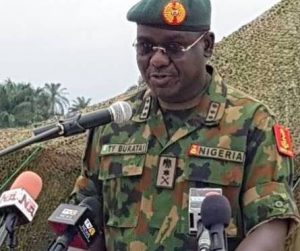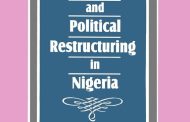It is one thing to be a very professional military but completely another to be regarded as such. A single metaphor can make that difference. As such a metaphor will not come from the military but most likely from the media or similar managers of meaning, most national militaries would avoid the temptation of regularly engaging players such as Amnesty International, (AI). For, AI is a foremost manager of meaning in the world today when it comes to monitoring human rights violations, especially in conditions of war. It would be argued that the Nigerian military has more reasons for avoiding regular spat with AI. In spite of Nigeria’s incoherence domestically, she is still regarded as a powerhouse in Africa. The Nigerian military is certainly part of that rating of the country. If not for the military’s pedigree in peacekeeping generally, then for its sacrifices within West Africa in the past few decades. As such, there is need for it to watch out against getting into regular spat with the transnational actor.

The late Gen Victor Malu and memories of Nigerian Army’s recent exertions

A Channels TV graphic of army spokesperson articulating the military standpoint
This is because the difference between AI and the Nigerian military will never be resolved in terms of who is right and who is wrong. Each is approaching the issue from how it understands its role. Critics say AI is part of the Western disciplinary machine for enforcing conformism on weaker states. But even then, AI is on moral high ground as far as the image of the vanguard of humanising war is concerned. Humanising war is high on the agenda of contemporary international security. The Nigerian military, on the other hand, sees itself as the protectors and guardians of national interest.
The current spat between the two must be the third or fourth in the wake of the counter-insurgency operation against Boko Haram, with AI alleging human rights violations which the military not only denies but also goes on to charge AI with undermining it. Still, it is the sort of spat in which victory could equally mean defeat and vice-versa. The sort of claims AI makes against the military are the sort of claims that sells. They bring back memories of Lynndie England and Abu Ghraib and all such horrible things that happen in wars, particularly in the current situation of an ‘everywhere war’ across Nigeria. In such situations, it is important for the military to appreciate that the action of a single corporal can do so much damage to the establishment. In the postmodern war, secrecy is the ultimate casualty because war has simply become a spectacle.
The mindset that AI and the Nigerian military are on different sides of the COIN is itself a problematic mindset. There are no reasons for a hostile relationship between the two all the time. Who says that both AI and the Nigerian military cannot work together in a war in which they are all stakeholders, even though from different angles of the conflict? Those who may be tempted to argue that AI is a non-Nigerian organisation and, therefore, only out for mischief need to rethink. There are ways by which such a relationship can be oiled to work smoothly without either getting on each other’s nerves.

Gen Buratai, COAS

The military brass hats with some political leaders, including the C-in-C
Chief of Army Staff, Gen Tukur Buratai, is completely right to say that the media should not portray the war against Boko Haram as a conflict between the military and the insurgents but between them and Nigeria. It is also nice to see that, in spite of partisanship, presidential candidates are drawing attention to the sacrifices of the military in their Christmas messages. But it is equally crucial to pay attention to ‘unheard screams’ or incredible stories of pain that actors such as AI are documenting. Many would argue that it is by such balance that the image of the military and of the country can be guaranteed. In a world ruled by images, that is an important part of the COIN operation. And it would be very dignifying to see the military itself sieze the high ground as a force for a humane conduct of war. Isn’t that too much to expect? No. A national military with so much at stake locally and globally needs to be able to do so. The uniform (Army, Navy, Air force) still elicits pride and a sense of security in the average citizen. This is something demonstrated every now and then as people dash into the barracks in moments of inter-group madness. It is a symbolism that can be easily interrogated by the action or inaction of a single officer. That ought to be something to be guarded against even when an AI is not documenting it. In other words, AI and the Nigerian military can understand each other. It is a matter of soft power, not the muscular nationalism favoured by those demonizing AI!




























